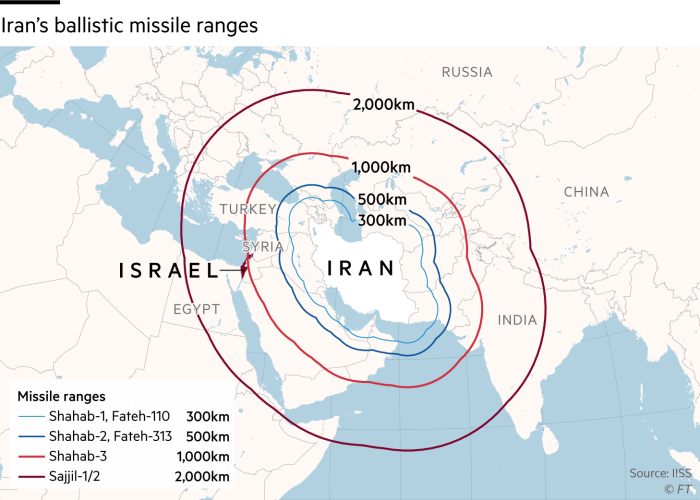Iran launched a barrage of drones and missiles at Israel on Saturday night in retaliation for a suspected Israeli strike in Damascus that killed several Iranian commanders, pushing the Middle East closer to a full-blown regional war.
Israeli officials said Iran had fired more than 300 projectiles, including 170 drones, 30 cruise missiles and 120 ballistic missiles at Israel, the first time that it had targeted the Jewish state directly. Iran-backed militants in Lebanon, Iraq and Yemen also fired rockets, drones and missiles at Israel.
Daniel Hagari, a spokesman for Israel’s military, said 99 per cent of the barrage had been intercepted. A Bedouin girl was critically injured by shrapnel in the south of the country and an air force base suffered minor damage, but there were no other reports of serious impacts, he said.
At 7.30am local time, Israel reopened its airspace, which it had closed ahead of the Iranian salvo. But it kept in place orders closing schools and limiting large gatherings, and Hagari said that the country remained “ready and prepared for additional threats and scenarios”.
Israel’s foreign minister Israel Katz reiterated previous Israeli threats to retaliate if Iran attacked it directly. “If Iran attacks Israel, Israel will attack Iran . . . All considerations will be taken into account,” he said in an interview with Israel’s Army Radio.
Hardliners demanded decisive action. “We need a crushing attack,” Itamar Ben-Gvir, Israel’s ultranationalist national security minister wrote on X.
General Mohammad Bagheri, chief of staff of the Iranian armed forces, said by targeting the Iranian consulate in Damascus in an attack on April 1, Israel had “crossed a red line that was unbearable”.
“The mission is accomplished and the operation is over and we have no intentions of going further,” Bagheri said, but if Israel opted to “commit any act against us, be it on our territory or our compounds in Syria and elsewhere, the next operation will be larger”.
US President Joe Biden condemned the “unprecedented” assault, and said that US aircraft and two US destroyers, one of which Washington moved to the region over the past week, had helped intercept the barrage. The UK and France also helped ward off the attack.
Biden said he would convene other G7 leaders on Sunday “to co-ordinate a united diplomatic response to Iran’s brazen attack”. Following a request from Israel, the UN Security Council also scheduled an emergency meeting for Sunday to discuss the attack.
The UK deployed RAF jets and refuelling tankers to the Middle East on Saturday to help intercept drone attacks. Prime Minister Rishi Sunak said: “I condemn in the strongest terms the Iranian regime’s reckless attack against Israel . . . The UK will continue to stand up for Israel’s security.”
Iran said it launched the barrage in response to Israel’s suspected strike on its consulate in Damascus on April 1, which marked a significant escalation of the hostilities that have engulfed the Middle East since the war between Hamas and Israel erupted in October.
In the past six months, Israeli forces have traded near-daily fire with Hizbollah in Lebanon, while other Iranian proxies in Iraq, Syria and Yemen have also fired missiles and drones at Israel.
But until now, Iran and Israel have avoided a direct confrontation. Despite their long history of enmity, the two countries have never exchanged fire using strikes launched from their own soil. Only once before — in 2018 — did Iranian forces based in Syria fire on Israel directly.
Iranian officials said the barrage had been launched in defence of Iran’s “sovereignty and territorial integrity”, and that the attack, which involved “dozens” of missiles and drones, had targeted Israeli military bases.
Tasnim news agency, which is affiliated to Iran’s elite Revolutionary Guards, described the assault as a “multi-layered attack from four directions”, deploying “hundreds of drones and a large number of missiles of different types”.
It added that Hizbollah, Iraqi militants and Houthi rebels in Yemen had all participated in the attack. Hizbollah said it had launched dozens of Katyusha rockets at an Israeli barracks in the Golan Heights.
In the wake of the barrage, Iran’s mission to the UN warned the US to “stay away” in comments on social media platform X.
The strike sparked condemnation from around the world, with countries from Japan to Saudi Arabia urging restraint, and UN secretary-general António Guterres saying he was “deeply alarmed about the very real danger of a devastating region-wide escalation”.

The Iranian attack “puts the region on the precipice of a broader regional war that almost no one seems to actually want”, said Jonathan Panikoff, director of the Atlantic council’s Scowcroft Middle East Security Initiative.
Iran’s first direct attack on Israel “shatters the previous conflict threshold” in their long-running war, he said. “What is clear is that this is the beginning of a new era, one in which Iran is willing to respond directly to Israeli attacks and in doing so risk retaliation against the Iranian homeland.”
US secretary of state Antony Blinken said that the US did “not seek escalation” and would hold talks with its allies in the “hours and days ahead”.
Israel had been bracing for an Iranian response since Tehran made clear that they considered the strike on the consulate in Damascus, which killed one of Iran’s most senior commanders in Syria and Lebanon, tantamount to an attack on its territory.
Late on Saturday the Israeli military announced a 1,000-person limit on public gatherings and shuttered schools, and ordered people in the occupied Golan Heights in the north of the country, and several areas in the south, to remain close to shelters.
Shortly after 11pm, Israel confirmed that Iran had launched its barrage, and just before 2am sirens went off in Jerusalem, across southern and northern Israel and in the Golan Heights. Skies over Israel were lit up by incoming missiles and Israeli air defence interceptors.
In a recorded statement earlier on Saturday Benjamin Netanyahu, Israel’s prime minister, said he appreciated the US “standing by Israel’s side”, and the support of the UK, France and other countries.
The long-serving premier also issued a direct threat to Iran. “I established a clear principle — whoever hurts us, we hurt him. We will protect ourselves from any threat and we will do so with composure and determination,” he said.
Additional reporting by Lauren Fedor in Dallas and Anna Gross in London

Sophie Anderson, a UK-based writer, is your guide to the latest trends, viral sensations, and internet phenomena. With a finger on the pulse of digital culture, she explores what’s trending across social media and pop culture, keeping readers in the know about the latest online sensations.








